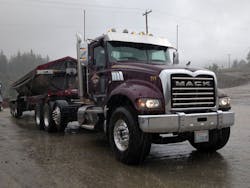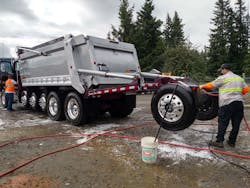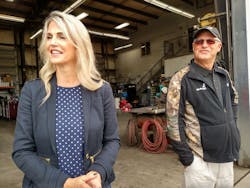Mack Granites Move Silver Streak
Would you name your company after a train, or a movie about a train? Paula McCann, founder of Silver Streak, a dump-trucking fleet near Tacoma, Washington, said she was in the midst of starting the outfit—something natural to her because “my husband was in trucking”—and began wondering about a name. “We came home one night and switched on the TV, and there was this movie, ‘Silver Streak,’” she recalls. “‘That’s it!’ I said,” and so it is.
The fleet’s business—hauling dirt, sand, gravel, rock, and other construction-related materials with multi-axle trucks—has nothing to do with the fictional hijacked passenger train chronicled in the 1976 comedic drama with Gene Wilder and Richard Pryor. McCann just likes the name. And she is aghast with the joking notion that the movie’s climax, where the train plows into a concrete platform at Chicago’s Union Station, has any relation to how the outfit is run. In fact, it’s a shining example of modern equipment and efficient fleet management, and officials with Mack Trucks highlighted Silver Streak and its people on a recent “Mack western” trip for members of the trucking press.
Silver Streak has been running Macks almost since its 1982 inception, and today most of its 59 power units are Mack Granites. McCann’s daughter, Tina Benson, had founded her own company in 1993 and bought Silver Streak from her mom in 1998. She later combined them. Tina is the president and her brother, Kevin McCann, is the shop supervisor and a vice president. They have only good things to say about their Macks and the support provided by the regional dealer, TEC Equipment. McCann is enthusiastic about Mack’s telematics system, called Guard Dog Connect, which alerts him of any malfunctions so they can be addressed early, and enables over-the-air updates to the trucks’ operating software. Among other things, telematics has so far eliminated any engine derates that can cripple a truck and interrupt a delivery, not to mention an expensive tow.
Mack is known as an eastern builder, starting in Brooklyn, New York, in 1900 and soon becoming entrenched in Allentown and the Lehigh Valley of Pennsylvania, where it still builds its trucks. But from 1966 to 1981, the manufacturer had a major presence in the West, specifically in Hayward, California, near Oakland, where its Mack Western arm designed and built lightweight West Coast-style trucks. Many were sleek, long-hooded machines with big diesels that were impractical in the more congested East with its strict length limits and little road room to romp.
That changed with expansion of the Interstate highway system and federal legislation that liberalized length laws nationwide. Stylish long-nose West Coast trucks became practical and popular in the Midwest and East, and Mack found it was shipping major components to California to assemble trucks that went east to work. It made more sense to build them back there, where the majority were sold, and thus Mack Western closed down. Other factors included labor union issues and the high cost of doing business in California. Yet the western spirit is alive today with Bulldog-adorned rigs running in the West, including Washington state, where Silver Streak operates.
The fleet’s Granites have strong 12.8-liter MP8 diesels and are nicely appointed so they’re pleasing to drivers. They certainly were to those of us reporters who hold commercial driver’s licenses, and drove a sampling of trucks and tractors around a large gravel pit outside town amid intermittent rain showers. A few of the vehicles were owned by City Transit, a friendly competitor that operates similar equipment. Even non-CDL holders could drive them because most had Allison automatic transmissions. Silver Streak has largely converted from manual gearboxes to automatics for their ease of driving, especially in stop-and-go traffic. They accelerate fast and reduce trip times, Kevin says. And, “We’re bringing people in now who haven’t been in the segment” because they’re never driven manual transmissions of any kind. With the Allisons, all they have to do is become accustomed to a truck’s size and weight, and learn the ins and outs of hauling and delivering bulk materials.
Of course, we delivered no loads and encountered no traffic because we did not access any of the Seattle-Tacoma area’s crowded streets and highways. We stayed out of trouble with guidance from veteran drivers. Two of those who rode shotgun with me said they liked the automatics, and felt more relaxed and better able to focus on the traffic and on the job at hand. There was one exception, a self-proclaimed “old school” driver who preferred a manual to an automatic, and Kevin ordered a new Granite tractor with a Fuller 18-speed just for him. I drove this, too, but liked the Allisons better.
Speaking of speeds, Silver Streak specs the 6-speed Allison 4500 RDS (Rugged Duty Series). Allison offers a 7-speed 4700 RDS that would help with startability, but it doesn’t seem necessary here. Mack people, meanwhile, are trying to interest the fleet in its mDrive HD, a heavier duty automated manual transmission based on the 12-speed highway version. For vocational uses, the HD can be had with 13 or 14 forward speeds, with the extra ratios at the low end. Mack sent a factory demonstrator truck with an mDrive for the fleet to try out and evaluate. Automated gearboxes require some knowledge and take some time to get used to, but like an Allison, remove much of the driving work and also cost less.
Like other bulk haulers here, Silver Streak operates seven- and eight-axle combinations. Some are four-axle tractors pulling four-axle dump trailers; others are truck-and-trailer rigs with varying axle layouts. Each type can legally gross up to 105,500 pounds and carry 32 to 34 tons. Most of its pup trailers have three and four axles pulled by five- and four-axle trucks, respectively. At least one of the pup axles steers. The latest truck-and-trailer combination uses a pup with two axles set widely apart; the forward axle is beneath a turntable that swings in turns and locks for backing. I pulled three differently configured pup trailers and the new design tracks as well or better than the others, and though it carries less payload, an additional lift axle gives the pulling truck enough capacity to make up for it.
The latest vehicle now being tried is a “super solo,” a single truck with three pusher axles and a swing-down tag axle, like the “booster” axles used on concrete mixer trucks in many states. This can carry a payload of 26 tons, somewhat less than the combo rigs, Kevin said. But it has an advantage in speedy unloading because there’s no trailer to deal with during the unloading process. This works well on short-distance runs. One thing it has in common with the other Silver Streak rigs is its handsome maroon color, along with a Superman-style double-S logo on doors and a multi-hued stripe on hoods. Why not a silver stripe, or streak? Well, the name’s about the movie and a train, not a color, and how the company goes is what’s important.


